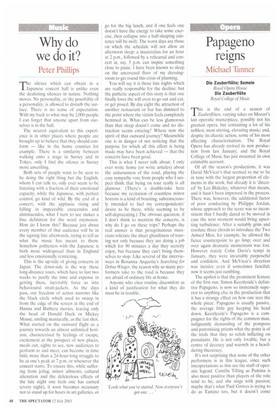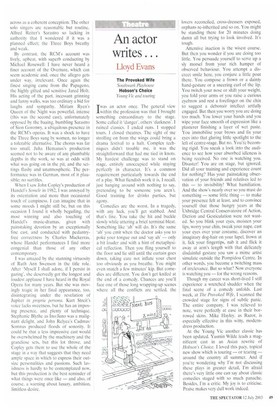Papageno reigns
Michael Tanner
Die Zauberfliite; Semele Royal Opera House Die Zauberfliite Royal College of Music
This is the end of a season of Zaubeffloten, varying takes on Mozart's last operatic masterpiece, possibly not his greatest opera, but containing a lot of his noblest, most stirring, elevating music; and, despite its chaotic action, some of his most affecting characterisation. The Royal Opera has already revived its new production from last January, and the Royal College of Music has just mounted its own estimable account.
Of all the season's productions, it was David McVicar's that seemed to me to be in tune with the largest proportion of elements in the work, but already it is 'directed' by Lee Blakeley, whatever that means, and it hasn't been improved in the process. There was, however, the additional factor of poor conducting by Philippe Jordan, whose approach to the score was so inconsistent that I hardly dared to be moved in case the next moment would bring upsetting turbulence. After a suitably grim and resolute three chords to introduce the Two Armed Men, for example, he allowed the fierce counterpoint to go limp; over and over again dramatic momentum was lost. However stately Colin Davis's tempi in January, they were invariably purposeful and confident. And McVicar's direction was incisive even if sometimes fanciful; now it seems just rambling.
The upshot is that the prominent feature of the first run, Simon Keenlyside's definitive Papageno, is now so immensely superior to anything else in the production that it has a strange effect on how one sees the whole piece. Papageno is usually passive, the average little guy keeping his head down. Keenlyside's Papageno is a campaigner for the rights of the common man, indignantly demanding of the pompous and patronising priests what the point is of the trials that they so relish inflicting on postulants. He is not only lovable, but a centre of decency and warmth in a bewildering theocracy.
It's not surprising that none of the other performers is in this league, since such interpretations as this are the stuff of operatic legend. Camilla Tilling as Parnina is also more positive than players of the role tend to be, and she sings with passion; maybe that's what Paul Groves is trying to do as Tamino too, but it doesn't come
across as a coherent conception. The other solo singers are reasonable but routine, Alfred Reiter's Sarastro so lacking in authority that I wondered if it was a planned effect; the Three Boys breathy and weak.
By contrast, the RCM's account was lively, upbeat, with superb conducting by Michael Rosewell: I have never heard a finer account of the Overture, which can seem academic and, once the allegro gets under way, irrelevant. Once again the finest singing came from the Papageno, the highly gifted and sensitive Jared Holt.
His acting of the part, incessant grinning and funny walks, was too ordinary a bid for laughs and sympathy. Miriam Ryen's Queen of the Night was powerful, intense (this was the second cast), unfortunately opposed by the baaing, bumbling Sarastro of Sion Goronwy, a ubiquitous presence in the RCM's operas. It was a shock to have the Three Boys sung by women, no longer a tolerable alternative. The chorus was far too small. Juha Hemanus's production seemed not to be aware of any plumbable depths in the work, so was at odds with what was going on in the pit, and the settings flashy and unatmospheric. The performance was in German, most of it plausible; no surtitles.
When I saw John Copley's production of Handel's Sent& in 1982, I was annoyed by
its ostentation and more than occasional touch of campiness. I can imagine that in some moods I might still be, but on this occasion I found it wholly beguiling, the most winning and also touching of Handers music-dramas, given with painstaking devotion by an exceptionally fine cast, and conducted with pedantryfree correctness by Charles Mackerras, whose Handel performances I find more congenial than those of any other contemporary.
I was amazed by the stunning virtuosity of Ruth Ann Swenson in the title role.
After 'Myself I shall adore, if I persist in
gazing', she deservedly got the longest and loudest applause I have heard in the Royal Opera for many years. But she was mov ingly tragic in her final appearance, too, disintegrating under the revelation of Jupiter in propria persona. Kurt Streit's voice lacks sweetness, but he has an imposing presence, and plenty of technique.
Stephanie Blythe as Ino/Juno was a malig nant delight, and John Relyea's Cadmus/ Somnus produced floods of sonority. It could be that a less impressive cast would be overwhelmed by the machinery and the grandiose sets, but this lot throve, and Copley gets them to use the whole of the stage in a way that suggests that they need ample space in which to express their out size personalities and passions. Such lav ishness is hardly to be contemplated now, but this production is the best reminder of what things were once like — and also, of course, a warning about luxury, ambition, limitless desire.



































































 Previous page
Previous page